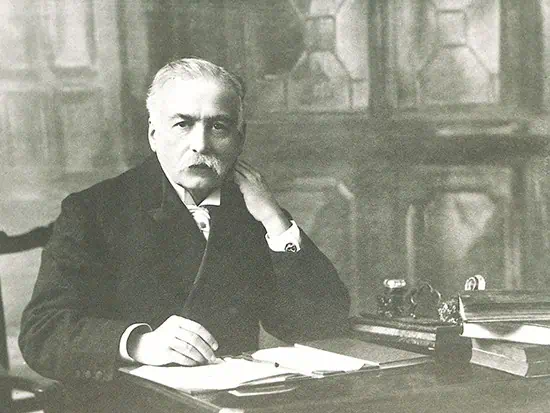Charity work

“Escoffier was always very concerned and revolted by social injustice. He was a fundamentally good and generous man, always attentive to others, and he proved it throughout his life.”
“No one ever turned to him in vain. One of his greatest concerns was to help young cooks get started in life. Unable to bear the sight of injustice or misery, he always showed himself helpful to the unfortunate. “
Auguste Escoffier reflects on the values he held so dear in his unpublished memoirs:
During this period at the Savoy, I was visited every morning by two nuns, riding in a cart hitched to a horse, driven by one of the old residents of their hospice. They would come to take the coffee grounds, not exhausted of their stimulating principles, the tea leaves that had only undergone a simple infusion, and all the bread from the toast trimmings.

I was touched by the admirable dedication of the Little Sisters of the Poor, who devoted their lives to improving the lot of the underprivileged.
I took an interest in this work. I took it to heart that everything the hotel could give them was particularly well cared for and of exemplary cleanliness; especially on days when I could add to their modest provisions the respectable number of 150 to 200 quails, from suppers served the night before. These quails, which lacked only the breast whites delicately removed for the customers, left two thighs adhering to the carcass! It is precisely in this part that the delicate aroma so appreciated by true game lovers is concentrated. These reliefs, prepared with rice according to my instructions, were delectable, and our old men were not insensitive to them. As this manna fell from the sky quite often, they called these days their “gala evening” and asked that the menu read: “Pilaw de Cailles à la mode des Petites Soeurs des Pauvres” (Quail Pilaw in the style of the Little Sisters of the Poor).
When we left the restaurant, we made sure that the quails were placed in an enamelled bucket reserved for this purpose, which was then locked in the cooler. The next day, I would hand the bucket over to the nuns, who would return it to me emptied of its contents.
One morning, to everyone’s dismay, we learned that the poor horse had died. I guessed that replacing the horse was causing Mother Superior some serious money worries.
I asked the Sisters to announce my visit for the following day. At the appointed hour, the Reverend Mother, a person as kind as she was distinguished, thanked me for my interest in her work and for our contribution to improving the lives of her elderly.
Finally, she confided in me her concern: she had her eye on a new horse to acquire on reasonable terms, but she was five pounds short.
This small sum was handed over the next day. Two days later, the new horse was driving the modest cart.
Barely a year later, it was my turn to ask Mother Superior for a favor. An old cook who had, in his time, known hours of glory in the best establishments of Paris, had come to London stranded without the slightest resource.
No longer fit to take on even a secondary position in a kitchen brigade, his only prospect was near misery.
I didn’t want to leave a former colleague in a difficult situation, so I took him in, creating a small business for him to live on, but it could only be a stopgap measure!
I therefore saw the possibility of getting him to join our little sisters. I approached the Mother Superior and explained the purpose of my visit.
We don’t have any space available at the moment,” she said, “but that’s no problem! We can always accommodate your protégé,” she added with a smile, “we owe you that much!”

Three days later, our old colleague, delighted with this unexpected solution, was taken in by the Little Sisters. He ended his life there in peace.
Not only during my stay at the Savoy, but also during the twenty years I spent at the Carlton, I continued, as far as I was able, to provide these old people with a few treats.
But alas! When I left England for good, my successors forgot all about the Little Sisters of the Poor… Later, during a brief stay in London, I visited them. They told me how much the old people had missed my departure – quail had disappeared from their tables overnight. All that remained of their “gala dinners” was a sweet nostalgia.
Disciples follow in their master's footsteps.
A large number of events are regularly organized each year in different regions of France and countries around the world. Profits from these events, as well as those from chapters and epicurean dinners, are donated to associations.
Every year, tens or even hundreds of thousands of Euros are donated to various associations. Either in money, know-how or raw materials.